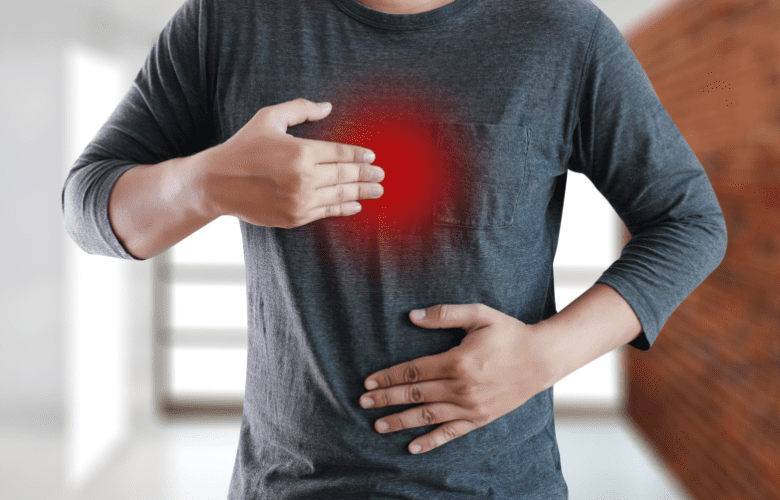Natural Home Remedies for Acid Reflux, Heartburn and GERD
Is your gut in great shape or do you find yourself suffering from chronic acid reflux or heartburn? It’s normal to experience acid reflux occasionally. However, if you’ve been having repeated episodes of acid reflux and heartburn (a burning in your chest), you may have developed gastroesophageal reflux disease (GERD), a more severe form of acid reflux.
GERD is a condition where acid-containing contents in your stomach leak back into your esophagus. This backwash or acid reflux runs up your throat and mouth, leaving you with a sour taste. It can also leave you feeling as if you have a lump in your throat, difficulty swallowing, chest pain, wheezing, hoarseness, and a chronic cough.
Truth be told, GERD can affect anyone. It is now the second most common digestive ailment in the US. Forty percent of Americans experience GERD symptoms, with 10–20% being affected on a weekly basis. The condition now affects about 20% of the worldwide population and continues to increase.
Regrettably, the ease of accessing over-the-counter medications, such as antacids and proton pump inhibitors (‘PPIs’), allows anyone to self-medicate. However, these drugs have been associated with harmful side effects, including gut dysbiosis. Long-term PPI use can also lead to more severe side effects, such as bone fractures, kidney issues, and cancers.
Here’s the good news! It is possible to reverse the chronic condition without relying on medications. Functional medicine offers a variety of natural remedies for GERD. However, understanding what really causes GERD is crucial for effectively healing your symptoms.
What causes GERD?
Contrary to popular opinion, GERD is not caused by excessive stomach acid. In fact, oftentimes, GERD is caused by too little acid especially as we age. In this case, it doesn’t make much sense to treat GERD with acid-suppressing drugs.
Stomach acid is a component of your body’s natural immune system. You need enough stomach acid to fight pathogens and digest food properly to stay healthy. However, if you have low stomach acid, many microorganisms may survive, enter the rest of your GI tract, and cause problems like GERD.
The bottom line is any amount of acid in the esophagus will cause issues. This is because its delicate lining is not acid-protected like the stomach lining.
So, what really causes GERD?
Let’s start by saying that there are many causes of GERD.
A weak Lower Esophageal Sphincter (LES) is one cause. The LES is a ring of muscles between your esophagus and stomach that acts like a valve between them. It opens to let food go down your esophagus to your stomach. Then it closes tightly to prevent acid from flowing back up into your throat. However, if the LES is weak or not functioning properly, food from the stomach can back up into the esophagus.
Another contributing factor has to do with an increase in intra-abdominal pressure (IAP). If there is excess pressure on the stomach due to gas, IAP can increase. An increase in IAP can cause the LES to malfunction and/or weaken. When this happens, gastric acid and other contents return up — or reflux — into your esophagus. This results in heartburn and other side effects.
A number of variables may contribute to an increase in your IAP, but they are not the primary causes. These include:
- Obesity
- Hiatal hernia
- Overeating
- Lying down after eating
- Bending down after eating
Carbohydrate malabsorption is the real culprit. Because your body cannot always absorb some carbohydrates, they ferment in your intestines. This causes gas bubbles in your stomach and esophagus, resulting in bacterial overgrowth and increased IAP.
GERD Symptoms
Symptoms of GERD can vary from person to person. Common symptoms include:
- Heartburn (usually after eating)
- Regurgitation
- Upper abdominal or chest pain
- Difficulty swallowing
- A sensation of a lump in your throat
- Coughing
- Asthma
- Nausea
- Pneumonia
- Hoarseness
- Dental decay
Dietary Triggers for GERD
While triggers are highly personal, some foods are consistently mentioned as triggering more than others. They are as follows:
- Spicy foods
- Fatty foods
- Coffee
- Carbonated drinks
- Alcohol
- Chocolate
- Tomatoes and tomato-based sauces
- Citrus fruits and juices
- Mint
- Onions
- Garlic
10 Natural Ways to Ease GERD Symptoms
Now that you understand what causes GERD, your best course of action is to seek the assistance of a trained functional medicine practitioner who can design a home-care plan for you. This involves dietary therapies and lifestyle changes. It will surely be worth it!
Diet is an essential component of your holistic treatment. That being said, you’ll need a starting point to determine the best diet to help heal your gut. Your practitioner will consider your specific sensitivities, digestive capacities, and microbial balances to tailor a diet plan for you that will:
- Mitigate bacterial overgrowth as well as low stomach acid
- Replenish gastric acid, enzymes, and nutrients essential for digestion
- Promote the growth of good bacteria and a healthy gut lining

Here are some natural remedies you might be asked to do:
-
Follow a low-carb diet.
A low-carb diet could be a helpful first step toward resolving your symptoms. There are no limits on carbohydrate types in this basic plan. You’ll work on reducing the amount of malabsorbed carbs in your diet by eating fewer carbs. This can help alleviate some of the gas and pressure caused by GERD.
Keep in mind that you don’t have to stick to a low-carb diet indefinitely. Once your gut has healed, your microbiota has been restored, and your gastric acid has been refilled, you can begin a moderate-carb diet.
-
Find your triggers.
Certain foods can cause acid reflux more than others. If you eat any of these items regularly, try eliminating them to see if it helps with your reflux. Then try reintroducing them one by one. As always, consult your practitioner for proper guidance.
Keep a meal journal and track the following to find your personal triggers:
- Foods you consume
- Time of day you eat
- Symptoms you experience
-
Take some herbs.
Bitter-tasting herbs or bitters are known to stimulate the flow of gastric juices and support upper digestive activity. These include:
- Ginger
- Fennel
- Barberry bark
- Dandelion
- Gentian root
- Globe artichoke
- Hops
- Milk thistle
- Wormwood
- Yellow dock
Other herbs used for GERD include:
- Licorice
- Chamomile
- Marshmallow
- Slippery elm
-
Take probiotics.
Probiotics of high-quality aid digestion and intestinal health. They help reduce bacterial overgrowth by protecting your body against pathogenic strains. Examples are:
- Yogurt
- Kefir
- Kimchi
- Sauerkraut
- Pickles
-
Eat smaller portions.
More reflux into the esophagus may occur when your stomach is particularly full. You might want to consider “grazing.” This means eating smaller meals more frequently instead of having three substantial meals each day.
-
Avoid drinking during meals.
It’s also a good idea to refrain from drinking water while eating. This dilutes gastric acid even more. The result? Your digestion and nutrition absorption will be hampered even further. We always suggest drinking fluids before or after your meal for this reason.
-
Stay up after eating.
Gravity helps keep acid in your stomach when standing or even sitting. Finish your meal at least three hours before going to bed. This means no afternoon naps, late dinners, or midnight nibbles. Lying down after a meal slows down the process of digestion.
-
Avoid rigorous activities after eating.
Avoid strenuous exertion for a few hours after eating. A walk outside is good, but a more vigorous workout can cause acid to enter your esophagus. Skip activities, particularly ones that require bending over.
-
Manage your weight.
Weight gain distributes the muscular framework that supports your LES, reducing the pressure that keeps your sphincter closed. This causes acid reflux and heartburn.
Maintaining a healthy body weight can help prevent acid reflux and alleviate some of your GERD symptoms. However, consult with your practitioner before attempting to lose weight.
-
Sleep on your left side or on an incline.
Sleeping on your left side prevents stomach acid from escaping into your esophagus. Resting in an inclined position also causes acid in your esophagus to return to your stomach more quickly, alleviating GERD symptoms. Ideally, your head should be 6-8 inches higher than your feet.
Final Thoughts on GERD
GERD can be treated with simple lifestyle and dietary changes. You do not have to put your health at risk by taking drugs to recover from this chronic disease. A functional medicine practitioner can help you optimize all areas of your gut health to minimize guesswork on your journey towards healing from GERD naturally. Book a virtual consultation now!










